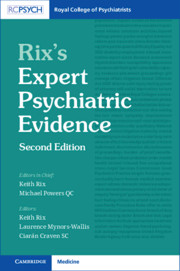Book contents
- Rix’s Expert Psychiatric Evidence
- Reviews
- Rix’s Expert Psychiatric Evidence
- Copyright page
- Contents
- Online Appendices – See Inside Cover for Access
- Contributors
- Foreword to the Second Edition
- Foreword to the First Edition
- Acknowledgements and Preface to the Second Edition
- Acknowledgements and Preface to the First Edition
- Table of Cases
- Table of Statutes and Directives
- Table of Statutory Instruments and Regulations
- Table of Practice Directions
- Table of Codes of Conduct, Guidance, Conventions and Protocols
- Abbreviations
- Chapter 1 The Expert Medical Witness
- Chapter 2 Courts, Laws and Procedures
- Chapter 3 Training, Development and the Maintenance of Expertise
- Chapter 4 Business Matters
- Chapter 5 The Medicolegal Consultation
- Chapter 6 The Report, Amendments, Answers to Questions, Experts’ Meetings and Conferences
- Chapter 7 Reports for Criminal Proceedings and in Prison Cases
- Chapter 8 Reports in Personal Injury Cases
- Chapter 9 Reports for Family Proceedings Relating to Children
- Chapter 10 Reports in Cases Involving Capacity Issues
- Chapter 11 Reports for the First-tier Tribunal (Health, Education and Social Care Chamber) Mental Health
- Chapter 12 Reports in Immigration and Asylum Cases
- Chapter 13 Reports in Employment, Disability Discrimination and Pension Cases
- Chapter 14 Reports for Fitness to Practise, Conduct and Performance Proceedings
- Chapter 15 Reports for Coroners Courts and Fatal Accident Inquiries
- Chapter 16 How to Read an Expert Medical Report
- Chapter 17 Going to Court
- Book part
- References
- Index
- Miscellaneous Endmatter
- References
Chapter 8 - Reports in Personal Injury Cases
Published online by Cambridge University Press: 22 January 2021
- Rix’s Expert Psychiatric Evidence
- Reviews
- Rix’s Expert Psychiatric Evidence
- Copyright page
- Contents
- Online Appendices – See Inside Cover for Access
- Contributors
- Foreword to the Second Edition
- Foreword to the First Edition
- Acknowledgements and Preface to the Second Edition
- Acknowledgements and Preface to the First Edition
- Table of Cases
- Table of Statutes and Directives
- Table of Statutory Instruments and Regulations
- Table of Practice Directions
- Table of Codes of Conduct, Guidance, Conventions and Protocols
- Abbreviations
- Chapter 1 The Expert Medical Witness
- Chapter 2 Courts, Laws and Procedures
- Chapter 3 Training, Development and the Maintenance of Expertise
- Chapter 4 Business Matters
- Chapter 5 The Medicolegal Consultation
- Chapter 6 The Report, Amendments, Answers to Questions, Experts’ Meetings and Conferences
- Chapter 7 Reports for Criminal Proceedings and in Prison Cases
- Chapter 8 Reports in Personal Injury Cases
- Chapter 9 Reports for Family Proceedings Relating to Children
- Chapter 10 Reports in Cases Involving Capacity Issues
- Chapter 11 Reports for the First-tier Tribunal (Health, Education and Social Care Chamber) Mental Health
- Chapter 12 Reports in Immigration and Asylum Cases
- Chapter 13 Reports in Employment, Disability Discrimination and Pension Cases
- Chapter 14 Reports for Fitness to Practise, Conduct and Performance Proceedings
- Chapter 15 Reports for Coroners Courts and Fatal Accident Inquiries
- Chapter 16 How to Read an Expert Medical Report
- Chapter 17 Going to Court
- Book part
- References
- Index
- Miscellaneous Endmatter
- References
Summary
In England and Wales, there is a three-year limitation period in most personal injury actions. In some HCA cases, and in professional negligence cases, it is six years. This is the period during which the claim must be brought. It begins in theory when the cause of action (i.e. the index incident) occurred. In HCA and clinical negligence cases, it begins when the claimant has the relevant ‘knowledge’: (1) that the injury was significant (whether a reasonable person with the claimant’s knowledge would have considered the injury sufficiently serious to justify suing a defendant who did not deny liability and had the means to pay, an objective test for which the impact of the claimant’s injuries on his ability to issue proceedings is not a relevant consideration (A v. Hoare [2008] UKHL 6); (2) that the injury is attributable in whole or part to the act or omission which constitutes the alleged negligence or breach of duty; and (3) the identity of the defendant.
- Type
- Chapter
- Information
- Rix's Expert Psychiatric Evidence , pp. 192 - 217Publisher: Cambridge University PressPrint publication year: 2020

